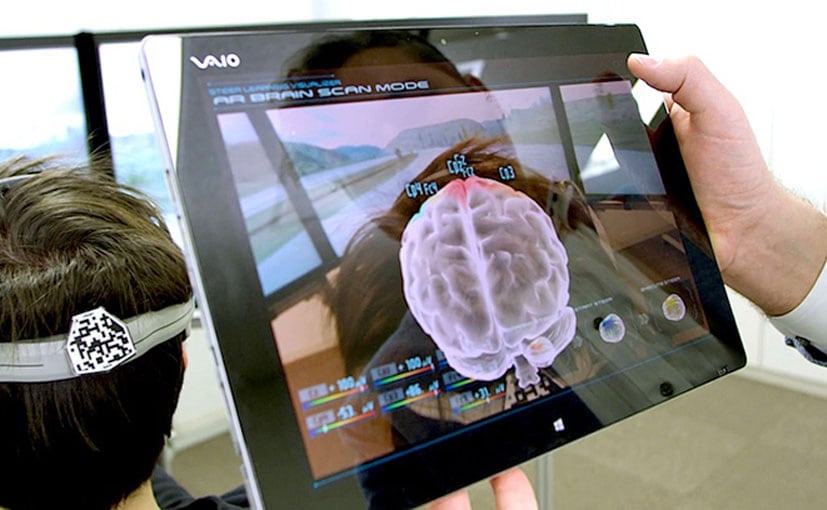Nissan Wants To Get Into Your Head With New Brain-To-Vehicle Technology

While the concept of vehicle to vehicle communication is still being formulated, the researchers at Nissan thought that it was not enough and went on in search of something more. Nissan today unveiled a research which will enable vehicles to interpret signals from the driver's brain, thus redefining how people interact with their cars.
The company's Brain-to-Vehicle, or B2V, technology promises to speed up reaction times for drivers and will lead to cars that keep adapting to make driving more enjoyable. Nissan will demonstrate capabilities of this exclusive technology at the CES 2018 trade show in Las Vegas.
Nissan's Executive Vice President Daniele Schillaci said, "When most people think about autonomous driving, they have a very impersonal vision of the future, where humans relinquish control to the machines. Yet B2V technology does the opposite, by using signals from their own brain to make the drive even more exciting and enjoyable. Through Nissan Intelligent Mobility, we are moving people to a better world by delivering more autonomy, more electrification and more connectivity."
The technology is a result of research into using brain decoding technology to predict a driver's actions and detect discomfort. By catching signs that the driver's brain is about to initiate a movement - such as turning the steering wheel or pushing the accelerator pedal - driver assist technologies can begin the action more quickly. This can improve reaction times and enhance manual driving. The technology also helps in detecting and evaluating driver discomfort, artificial intelligence can change the driving configuration or driving style when in autonomous mode.
Dr. Lucian Gheorghe, senior innovation researcher at the Nissan Research Center in Japan, is leading the B2V research. Nissan's B2V technology is the world's first system of its kind. The driver wears a device that measures brain wave activity, which is then analyzed by autonomous systems. By anticipating intended movement, the systems can take actions - such as turning the steering wheel or slowing the car - 0.2 to 0.5 seconds faster than the driver, while remaining largely imperceptible.
It's certainly an interesting concept and Nissan is trying to get into your head and that for a change will prove to help in improving safety systems on cars.
Latest News
 Bilal Firfiray | Feb 12, 2026MG Majestor vs MG Gloster: What’s New, What’s Different?MG Majestor replaces the Gloster as MG’s new flagship SUV for 2026. Here’s a detailed comparison between the two.4 mins read
Bilal Firfiray | Feb 12, 2026MG Majestor vs MG Gloster: What’s New, What’s Different?MG Majestor replaces the Gloster as MG’s new flagship SUV for 2026. Here’s a detailed comparison between the two.4 mins read car&bike Team | Feb 12, 20262026 MG Majestor: Variants, Features, Specifications ExplainedThe Majestor will be offered in two key trim levels including Sharp and Savvy and in both two-wheel and four-wheel drive variants.2 mins read
car&bike Team | Feb 12, 20262026 MG Majestor: Variants, Features, Specifications ExplainedThe Majestor will be offered in two key trim levels including Sharp and Savvy and in both two-wheel and four-wheel drive variants.2 mins read car&bike Team | Feb 12, 20262026 MG Majestor SUV: In PicturesAlong with the new positioning, the SUV features a heavily updated design and styling; here’s a detailed look at it in pictures.1 min read
car&bike Team | Feb 12, 20262026 MG Majestor SUV: In PicturesAlong with the new positioning, the SUV features a heavily updated design and styling; here’s a detailed look at it in pictures.1 min read car&bike Team | Feb 12, 2026Tata Punch EV Facelift Spotted Ahead Of February 20 LaunchThe Punch EV facelift appears to be identical to the ICE counterpart.4 mins read
car&bike Team | Feb 12, 2026Tata Punch EV Facelift Spotted Ahead Of February 20 LaunchThe Punch EV facelift appears to be identical to the ICE counterpart.4 mins read Amaan Ahmed | Feb 12, 2026MG Majestor SUV Unveiled In India Ahead Of April 2026 LaunchReplacing the Gloster in the lineup, the Majestor will be the new MG flagship SUV in India, and deliveries will begin in the month of May.1 min read
Amaan Ahmed | Feb 12, 2026MG Majestor SUV Unveiled In India Ahead Of April 2026 LaunchReplacing the Gloster in the lineup, the Majestor will be the new MG flagship SUV in India, and deliveries will begin in the month of May.1 min read Jaiveer Mehra | Feb 12, 2026Mahindra Eyes Increasing Production Capacity Of ICE & Electric SUVs By Up To 7,000 Units Per Month By Q2 FY2027Carmaker said that currently models such as the Bolero, Bolero Neo and XUV 3XO are being manufactured at peak capacity.3 mins read
Jaiveer Mehra | Feb 12, 2026Mahindra Eyes Increasing Production Capacity Of ICE & Electric SUVs By Up To 7,000 Units Per Month By Q2 FY2027Carmaker said that currently models such as the Bolero, Bolero Neo and XUV 3XO are being manufactured at peak capacity.3 mins read
 Bilal Firfiray | Feb 12, 2026BMW X3 30 xDrive M Sport Review: The Driver’s SUV ReturnsRange-toppingX3 30 xDrive M Sport brings back the fun with 255bhp and genuine enthusiast appeal. Does this performance-focused SUV stand out?5 mins read
Bilal Firfiray | Feb 12, 2026BMW X3 30 xDrive M Sport Review: The Driver’s SUV ReturnsRange-toppingX3 30 xDrive M Sport brings back the fun with 255bhp and genuine enthusiast appeal. Does this performance-focused SUV stand out?5 mins read Bilal Firfiray | Feb 11, 2026Mercedes-AMG CLE 53 Coupe Review: The Goldilocks AMG?The Mercedes-AMG CLE 53 Coupe is a concoction of hooliganistic performance and everyday usability. Here’s why this Rs 1.5 crore two-door AMG might be the perfect modern sports coupe for India.6 mins read
Bilal Firfiray | Feb 11, 2026Mercedes-AMG CLE 53 Coupe Review: The Goldilocks AMG?The Mercedes-AMG CLE 53 Coupe is a concoction of hooliganistic performance and everyday usability. Here’s why this Rs 1.5 crore two-door AMG might be the perfect modern sports coupe for India.6 mins read Girish Karkera | Feb 11, 2026Toyota Ebella EV Review: Compact And Fun-To-Drive With The Promise Of Stress-Free AftersalesNo hiding the fact that it is a clone of the Maruti Suzuki eVitara, but the first all-electric Toyota in India is reasonably well-rounded8 mins read
Girish Karkera | Feb 11, 2026Toyota Ebella EV Review: Compact And Fun-To-Drive With The Promise Of Stress-Free AftersalesNo hiding the fact that it is a clone of the Maruti Suzuki eVitara, but the first all-electric Toyota in India is reasonably well-rounded8 mins read Bilal Firfiray | Feb 10, 2026Tata Punch EV Long Term Review: Small EV With A Big-Hearted PersonalityWith the new Punch EV Facelift just around the corner, we decided to take a look at what it excels at and what could be improved.7 mins read
Bilal Firfiray | Feb 10, 2026Tata Punch EV Long Term Review: Small EV With A Big-Hearted PersonalityWith the new Punch EV Facelift just around the corner, we decided to take a look at what it excels at and what could be improved.7 mins read Bilal Firfiray | Feb 4, 2026Volkswagen Tayron R-Line Review: Sensible Flagship For IndiaVolkswagen has introduced a made-in-India flagship SUV that offers space, comfort, performance, and German driving finesse in a practical three-row package. But is the Tayron R-Line good enough?6 mins read
Bilal Firfiray | Feb 4, 2026Volkswagen Tayron R-Line Review: Sensible Flagship For IndiaVolkswagen has introduced a made-in-India flagship SUV that offers space, comfort, performance, and German driving finesse in a practical three-row package. But is the Tayron R-Line good enough?6 mins read






























































































































